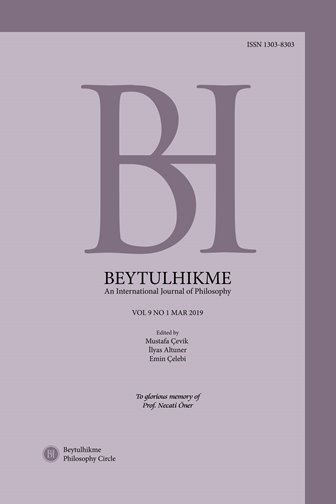İbn Rüşd’ün Heyûlânî Aklın Faal Akıl ile İttisali ve Özdeşliği Görüşünün Aquinas’ın Eleştirileri Bağlamında Değerlendirilmesi
Author :
Abstract
Çalışmamızda, Aristo’nun akıl tanımından hareketle kendi akıl doktrinlerini oluşturan İbn Rüşd ve Thomas Aquinas’ın heyûlânî aklın faal akıl ile ittisalinin imkanı ve özdeşliği meselesine dair görüşlerinin neden ve ne ölçüde farklılaştığını ele alacağız. İbn Rüşd, kadim Yunan şarihleri Afrosdisyalı İskender ve Themistius ile İbn Bacce’nin faal akıl tanımlarını benimseyerek faal aklın ayrık, ezeli ve tek bir akıl olduğunu; onun akledilirler üzerinden her bir bireyle ittisal ettiğini ileri sürerken; Aquinas ise faal aklın mümkün akıl gibi akli nefsin bir kuvvesi olduğunu, bireylerin sayısına göre niceliksel olarak arttığını iddia etmiştir. Faal aklın akledilirleri soyutlaması ve bilfiilleştirmesi hususundan İbn Rüşd ile hemfikir olmakla birlikte Aquinas, İbn Rüşd’ün ayrık ve tek faal akıl anlayışını genel anlamda iki açıdan eleştirmiştir. Bunlardan ilki, faal aklın ayrık, tek ve müşterek bir cevher olmadığı, nefsin bir kuvvesi olduğu; ikincisi de, faal aklın sonradan akledilirler üzerinden bireyle ittisalinin bireyi bizathi akleden kılamayacağıdır. Buna göre bireyin bizatihi akleden olabilmesi için faal aklın nefsten ayrık, aşkın ve tek bir akıl değil, aksine nefsin akleden melekesinin bilfiil bir yönü olması gerekmektedir.
Keywords
Abstract
This study aims to highlight that why and how much the views of Averroes and Thomas Aquinas, who formed their own doctrines of intellect on Aristotle's intellect doctrine, differentiate on the possibility of material intellect conjunction with agent intellect and their identity. Averroes partly adopted the view of Ancient Greek commentators -Alexander of Aphrodisias, Themistius- and Ibn Bajja's agent intellect thesis and he argues that the agent intellect is external, eternal and one, its conjuncts with each individual through intelligible. Nevertheless, Aquinas argued that the agent intellect is united to the soul as its faculty and it numerically multiplied according to the number of individuals. Aquinas, who agrees with Averroes for the abstraction and actualization of intelligible, has criticized Averroes' separate and one agent intellect doctrine from two points: The first one is that the agent intellect is not a separate, single and common intellect, and the second it if separate intellect conjunct with individuals through intelligible it will not suffice to make each individual understand per se. Therefore, in order for the individual to be per se understand, the agent intellect should not be a discrete, transcendent, and a single intellect, but an actual aspect of faculty of the individual intellectual soul.
Keywords
- Aquinas, T. (1946a). Summa Theologica, I-III. (Trans. Fathers of English Domini- can Province). New York: Benziger Brothers, Inc.
- Aquinas, T. (1946b). The Commentary of St. Thomas Aquinas on Aristotle’s Treatise on the Soul. (Trans. R. A. Kocourek). Minnesota: St. Paul, Minn. College of St. Thomas.
- Aquinas, T. (1949a). On Spiritual Creatures (De Spiritualibus Creaturis). (Trans. M. C. Fitzpatrick & J. J. Wellmuth). Milwaukee: Marquette University Press.
- Aquinas, T. (1949b). The Soul: A Translation of St. Thomas Aquinas’ De Anima (Dis- puted Questions on De Anima). John Patrick Rowan: B. Herder Book Co.
- Aquinas, T. (1956). Summa Contra Gentiles, I-IV. (Trans. J. F. Anderson). London: University of Notre Dame Press.
- Aquinas, T. (1968). On the Unity of the Intellect Against the Averroists (De Unitate Intellectus Contra Averroistas). (Trans. B. H. Zedler). Milwaukee: Marquette University Press.
- Aquinas, T. (1999). Commentary on Aristotle’s De Anima. (Trans. R. Pasnau). New Haven: Yale University Press.
- Aquinas, T. (2009). Compendium of Theology. (Trans. R. J. Regan). Oxford: Oxford
- Aquinas, T. (2013). Commentary on Book II of the Sentences, Distinction 17, Question 2, Ariticle 1. (Trans. R. Taylor). Philosophical Psychology in Arabic Thought and the Aristotelianism of the 13th Century. (Eds. L. X. Lopez & F. and J. A. Tellkamp). Paris: J. Vrin, 279-96..
- Arkan, A. (2015). İbn Rüşd Psikolojisi: Fizikten Metafiziğe İbn Rüşd’ün İnsan Tasavvu- ru. İstanbul: İz Yayıncılık.
- Black, D. (1993). Consciousness and Self-Knowledge in Aquinas’s Critique of Averroes’s Psychology. Journal of the History of Philosophy, 31, 349-385.
- Black, D. (1999). Conjunction and the Identity of Knower and Known in Aver- roes. American Catholic Philosophical Quarterly, 73, 159–84.
- Dönmez, S. (2009). Aklın Birlikten Çokluğa Yolculuğu: 13. Yüzyıl Latin İbn Rüşdçülü- ğü Bağlamında Aklın ya da Akılların Birliği Problemi. Ankara: Birleşik Yayınevi.
- Ivry, A. L. (1966). Averroes on Intellection and Conjunction. Journal of the Ameri- can Oriental Society, 86 (2), 76-85.
- İbn Rüşd (1950). Telhisu Kitabi’n-Nefs. (Ed. A. F. el-Ehvani). Kahire: Mektebetu’n Nahdati’l Mısriyye.
- İbn Rüşd (1967-73). Tefsîr Mâ Ba‘de’t-Tabîa: Grand Commentaire de la Me ́taphysique. (Ed. M. Bouyges). Beyrut: Dâru’l-Maşrık.
- İbn Rüşd (1982). The Epistle on the Possibility of Conjunction with the Active Intellect by Ibn Rushd with the Commentary of Moses Narboni: A Critical Edition and Annotated Translation. (Trans. & ed. K. Bland). New York: Jewish Theological Seminary of America.
- İbn Rüşd (2002). Middle Commentary on Aristotle’s De Anima: A Critical Edition of the Arabic Text with English Translation, Notes, and Introduction. (Trans. & ed. A. L. Ivry). Utah: Brigham University Press.
- İbn Rüşd. (2009). Averroes’s Long Commentary on the De Anima of Aristotle. (Trans. & ed. R. Taylor). New Haven: Yale University Press.
- Miller, F. (2012). Aristotle on the Separability of Mind. The Oxford Handbook of Aristotle. (Ed. C. Shields). Oxford: Oxford University Press, 306-39.
- Sarıoğlu, H. (2012). İbn Ru ̈şd Felsefesi. İstanbul: Klasik Yayınları.
- Taylor, R. (2009). Intellect as Intrinsic Formal Cause in the Soul According to Aquinas and Averroes. The Afterlife of the Platonic Soul: Reflections ofPlatonic Psychology in the Monotheistic Religions. (Eds. M. Elkaisy-Friemuth & J. Dillon). Leiden: Brill.





